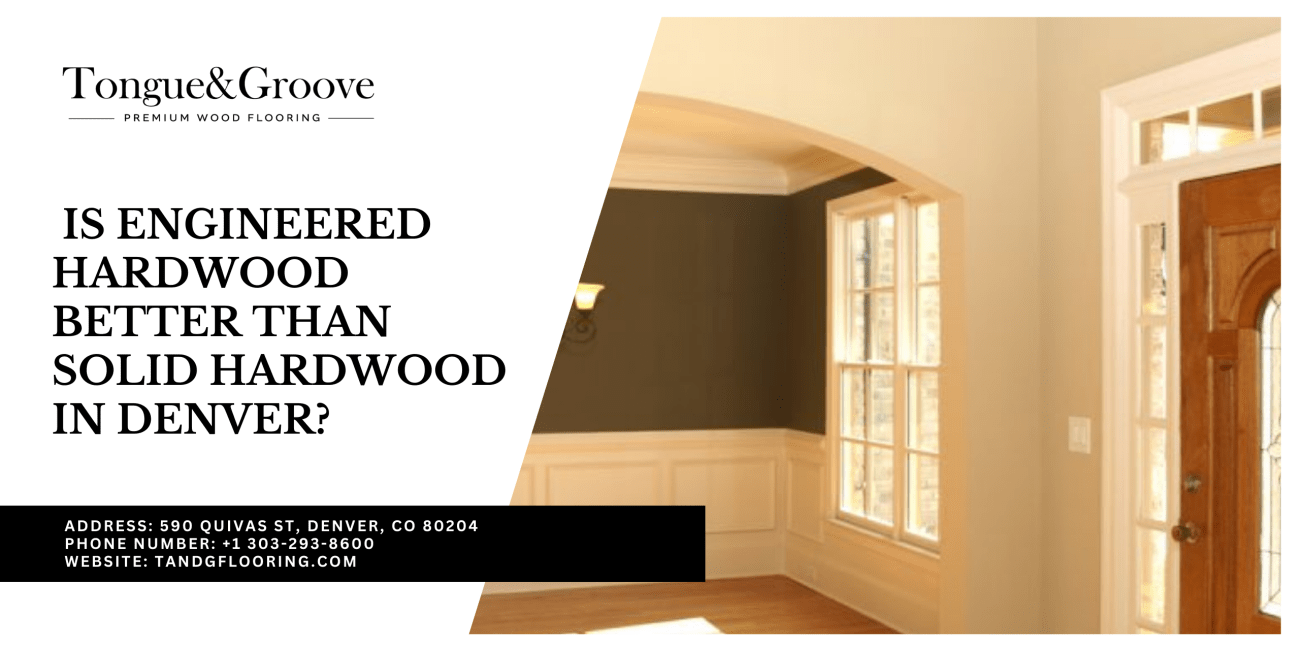With so many wood flooring options, buyers in Denver often ask: “Which is better—engineered hardwood or solid hardwood?” The answer depends on your specific needs, style, and living conditions. Let’s explore how each performs and which is best for your home.
Table of Contents
ToggleUnderstanding the Difference
Solid hardwood is crafted from a single piece of wood—durable and refinishable, but sensitive to moisture and temperature fluctuations. Engineered wood, on the other hand, pairs a real wood veneer with a layered plywood or HDF core. As Chris, owner of Tongue & Groove, explains:
“Engineered wood has a real veneer… It’s 90% of what’s used today. It’s real wood on a different core.”
Both offer authentic wood surfaces, but their construction affects performance, installation, and long-term care.
Durability & Stability for Denver’s Climate
Denver’s altitude and seasonal temperature swings can cause solid hardwood floors to expand and contract—leading to cupping or gaps. Engineered hardwood’s cross-layered core is designed to withstand these fluctuations, making it more stable under real-world conditions. If you’ve got radiant heat or moist spaces like basements, engineered wood makes more sense..
Longevity & Maintenance
Solid hardwood can be refinished numerous times, making it a generational flooring choice. However, engineered wood with a quality thick veneer (4–6 mm) also offers refinishing potential. Both require proper maintenance—like regular cleaning and avoiding excess moisture—to stay beautiful.
Installation Options & Site Considerations
Solid hardwood demands nail-down installation, limiting its use when it comes to concrete subfloors. Engineered wood is versatile—it can be nailed, floated, glued, or installed over some radiant heat systems. Just remember to check the warranty. For multi-level homes or basement installations, engineered wood provides greater flexibility, often with simpler, quicker installation.
Aesthetic Options & Design Flexibility
Both types come in a variety of species—white oak, walnut, hickory—and finishes. Engineered wood allows for artisan looks, including hand-scraped or wide plank designs, often at a lower cost. Exotic or reclaimed wood styles are also more accessible with engineered products, offering style without the hefty price tag..
Cost Comparison
Solid and engineered hardwood floors come at different price points. We explain why below:
- Solid hardwood: usually comes with higher material and install costs—plus added prep for uneven subfloors
- Engineered hardwood: tends to offer comparable beauty and performance at a more affordable overall price
In Denver’s market, engineered flooring often delivers better value for similarly premium appearance
Tongue & Groove’’s mill-direct sourcing boosts savings on both types, allowing you to invest in quality without overspending.
Resale Value & Buyer Expectations
While solid hardwood is still highly sought-after. However, in Denver, well-installed, top-quality engineered wood adds nearly equal appeal—provided it has a thick real wood veneer. Buyers care more about appearance, craftsmanship, and durability than the core structure beneath.
Environmental Considerations
Engineered wood uses less hardwood overall and can contain sustainably certified veneers (FSC), making it eco-friendly. It lets you enjoy real wood aesthetics with lower environmental impact.
Choosing with Confidence
The “right” flooring will be different for everyone, especially when it comes to hardwood. At Tongue & Groove, we guide clients through:
- Lifestyle assessment: family size, pets, subfloor type
- Budget planning: comparing material and lifetime cost
- Floor selection: species, finish, and plank width
- Installation method: based on structure and subfloor
Our Wood Floors 101 course and experienced showroom staff are here to help you make informed decisions—without pressure.
Final Takeaway
Is engineered hardwood better than solid in Denver? For many homes—yes. Particularly in areas with moisture concerns, or for quick and flexible installations, engineered wood offers:
- Real wood appearance
- High climate stability
- Cost-effective and versatile install
- Eco-conscious sourcing
However, if you prioritize maximum longevity and don’t mind the climate sensitivity, solid hardwood remains a top-tier choice. If you’re ready for new hardwood floors in Denver, Tongue & Groove is here to help. Contact us today to get started!


